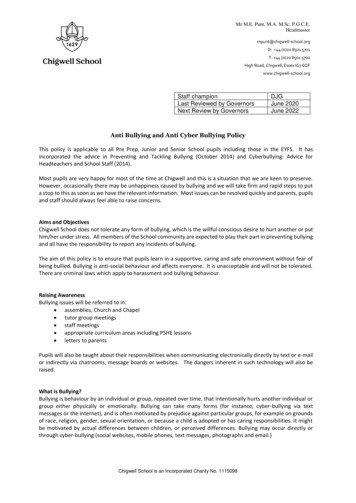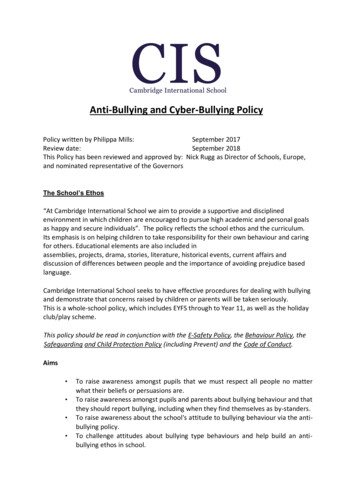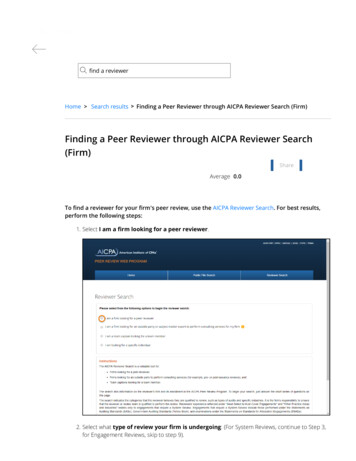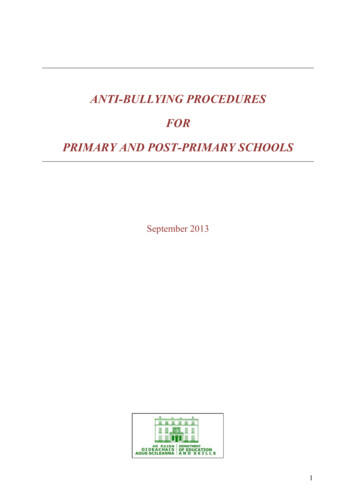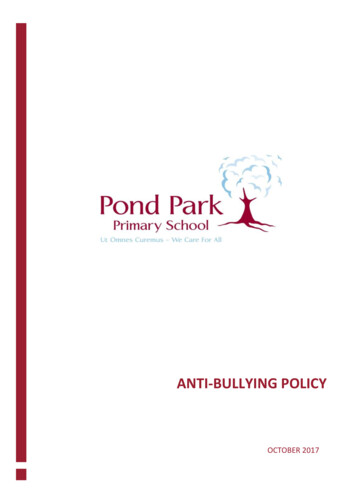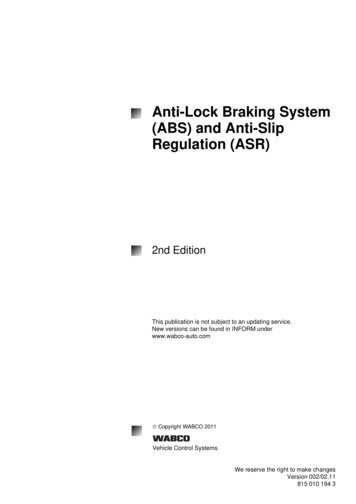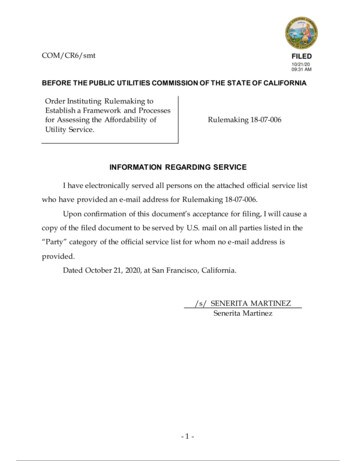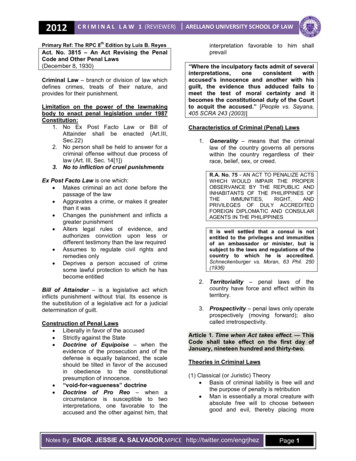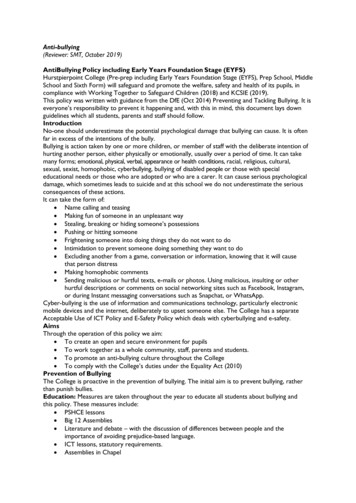
Transcription
Anti-bullying(Reviewer: SMT, October 2019)AntiBullying Policy including Early Years Foundation Stage (EYFS)Hurstpierpoint College (Pre-prep including Early Years Foundation Stage (EYFS), Prep School, MiddleSchool and Sixth Form) will safeguard and promote the welfare, safety and health of its pupils, incompliance with Working Together to Safeguard Children (2018) and KCSIE (2019).This policy was written with guidance from the DfE (Oct 2014) Preventing and Tackling Bullying. It iseveryone’s responsibility to prevent it happening and, with this in mind, this document lays downguidelines which all students, parents and staff should follow.IntroductionNo-one should underestimate the potential psychological damage that bullying can cause. It is oftenfar in excess of the intentions of the bully.Bullying is action taken by one or more children, or member of staff with the deliberate intention ofhurting another person, either physically or emotionally, usually over a period of time. It can takemany forms; emotional, physical, verbal, appearance or health conditions, racial, religious, cultural,sexual, sexist, homophobic, cyberbullying, bullying of disabled people or those with specialeducational needs or those who are adopted or who are a carer. It can cause serious psychologicaldamage, which sometimes leads to suicide and at this school we do not underestimate the seriousconsequences of these actions.It can take the form of: Name calling and teasing Making fun of someone in an unpleasant way Stealing, breaking or hiding someone’s possessions Pushing or hitting someone Frightening someone into doing things they do not want to do Intimidation to prevent someone doing something they want to do Excluding another from a game, conversation or information, knowing that it will causethat person distress Making homophobic comments Sending malicious or hurtful texts, e-mails or photos. Using malicious, insulting or otherhurtful descriptions or comments on social networking sites such as Facebook, Instagram,or during Instant messaging conversations such as Snapchat, or WhatsApp.Cyber-bullying is the use of information and communications technology, particularly electronicmobile devices and the internet, deliberately to upset someone else. The College has a separateAcceptable Use of ICT Policy and E-Safety Policy which deals with cyberbullying and e-safety.AimsThrough the operation of this policy we aim: To create an open and secure environment for pupils To work together as a whole community, staff, parents and students. To promote an anti-bullying culture throughout the College To comply with the College’s duties under the Equality Act (2010)Prevention of BullyingThe College is proactive in the prevention of bullying. The initial aim is to prevent bullying, ratherthan punish bullies.Education: Measures are taken throughout the year to educate all students about bullying andthis policy. These measures include: PSHCE lessons Big 12 Assemblies Literature and debate – with the discussion of differences between people and theimportance of avoiding prejudice-based language. ICT lessons, statutory requirements. Assemblies in Chapel
DramaTutor periods- discussionsCEOP training relating to cyber-bullying‘A Friendly Ear’ – Listening service run by DSL and Deputy DSLPastoral Intervention Practitioner (PIP) in the Prep and Pre-prep, working individually withpupils or with small groups. Helping with variety of issues including conflict resolution. Regular Guardian meetings – Prep and Senior school Code of Conduct – written in consultation with the children and reviewed at the start ofeach academic year (Prep) Playground Rules – written and agreed by children. Displayed clearly in the playground inthe Prep school. The STOP BULLYING button on the Communication part of every child’s portal.TrainingAppropriate training across the College is arranged to ensure that those with responsibility havethe necessary skills to deal with cases of bullying. This training includes:The training of Prefects and GuardiansGuidance for staff, in the Staff Handbook, on the importance of promoting good behaviour amongstudents, by ensuring the effective implementation of this policy.Pupils’ responsibilitiesWe emphasise, with senior students, the role which is expected of them in setting a good exampleand being helpful to younger children and each other. In particular: A buddy system for new students is operated. Older students are encouraged to keep an eye on younger children and offer support. Guardians are trained to help identify and then support victims as well as supporting bulliesto modify their behaviour (with supervision) The Chaplain is also available to help and support all students who find themselves indifficulty. There is also a ‘Contact the Chaplain’ button on each Senior student’s portal.
Bullying Incident - Procedure for Staff
Supporting the VictimWe support the victim(s) in the following ways: Offer them the opportunity to talk about the experience with someone they trust – aschool counsellor, the PIP, HoM, tutor, class teacher, HoY, DSL or the Chaplain. Informing the victim’s parents/guardians and working with them to ensure that theappropriate support is provided. Monitoring the situation and offering continued support when needed, seeking advice fromexternal agencies as appropriateSupporting the CulpritThe process of supporting the culprit should, whenever possible, include providing whatever supportand guidance are judged necessary: Ascertain the reason(s) that might underlie the bullying behaviour – if there is a concern thatthe pupil is at risk of significant harm, the procedures in the College’s Safeguarding Policy willbe followed. Inform parents/guardians and working with them as necessary to try to change the student’sbehaviour When appropriate, provide or arrange appropriate counselling. Disciplinary action in accordance with the College’s Behaviour and Discipline Policy. Monitor subsequent behaviour.Cyber BullyingPupils are frequently reminded via assemblies, tutor sessions and Internet Awareness Days on howto use the internet in a positive way. The School also has a comprehensive Use of School NetworkPolicy which is frequently reviewed. The DSL is a CEOP Ambassador trainer and works across all 3schools delivering e-safety training. Cyberbullying differs from other forms of bullying as it may takeplace at any time of day, the potential audience is huge and the bullying can take place at home andaway from school. Cyberbullying may consist of threats, fraping, harassment, embarrassment,humiliation, defamation or impersonation. It may take the form of general insults, or prejudice-basedbullying, for example homophobic, sexist, racist or other forms of discrimination via the misuse of: Virtual Learning Environments Chat rooms Websites Social networking sites Mobile and fixed-point phones Digital cameras Games and virtual world sitesDisciplinary ActionsAlthough the Heads of Prep and Senior school reserve the right to permanently exclude a student atany stage of the process, disciplining the culprit may involve one or more of the following,depending on their age: Warning Informing parents/guardians Behaviour Contract Detention Internal suspension Fixed term suspension Permanent exclusionBullying incidents are followed up and the pupils are monitored over time, both the perpetrator/sand the victim(s). This is done to ensure that the perpetrators do not slip back into their bullyinghabits and the victims feel safe and secure. All disciplinary action will be taken in accordance with theCollege’s Behaviour and Discipline Policy and any sanction will be employed promptly. Records of
any such disciplinary action will be kept on the College’s Bullying File (kept by the DSL) and, whereappropriate, the College’s central record of sanctions for serious misbehaviour.Record Keeping and MonitoringSchool staff maintain records of the students in their Form or House via the online Journal. Inaddition, every complaint or report of bullying must be recorded in the Bullying File. The DSL andDeputy Head (Pastoral Care), Head of Prep School and Head of Senior School monitor theserecords in order to enable patterns to be identified, both in relation to individual pupils and acrossthe College as a whole, so that any necessary interventions can be made to evaluate theeffectiveness of the College’s approach. In addition, the DSL reviews the file termly and reports toGovernors.Information for studentsWhat can you do if you are being bullied? Remember that your silence is the bully’s biggest weapon. Tell yourself that you don’t deserve to be bullied and that it is wrong Be proud of who you are- it is good to be individual Try not to show that you are upset- a bully thrives on fear Stay with a group of friends –safety in numbers Be assertive. Shout NO! Walk away confidently and go straight to a member of staff Don’t fight back, physically or verbally, it can make things worse. Try to stay calm and look confident Get away from the situation as quickly as you can. Tell an adult you trust straight away. Tell your parents, your HoM, your tutor, your HoY orclass teacher, the Chaplain, a Guardian, the DSL, the College counsellor, a responsible olderstudent, or email via the STOP BULLYING button.You might also contact:The Medical Centre staffOur Independent Listener – Jerome Joseph (07944 114907)ChildLine 08001111The Children’s Commissioner (08005280731) Mon-Fri 9am-5pmIf you are worried about speaking up, take a friend along for support. Teachers deal with bullies in away that will aim to end the bullying and they will always be sensitive about trying not to make thingsworse for you.If you know someone is being bullied: Take action! If you watch or laugh along with the bully, you are the bully! If you feel that you cannot get involved, tell an adult immediately. Teachers can always hidethe fact that you reported it. Do not be, or pretend to be, friends with a bully. If you are worried about another student’s wellbeing, or are worried that they might hurtthemselves, tell an adult immediately.If you are being cyber-bullied: Where appropriate, keep any potential evidence, for example, any text message or email. Talk to someone as soon as possible – another student, prefect, guardian, teacher oranother adult you trust. Report any such bullying immediately. Perpetrators risk immediate suspension or expulsion.Information for Parents Look for unusual behaviour in your children. Not wanting to go to school, feel ill regularly, andtake a dip in grades. Ask your child how their day has gone, who they spent time with etc. If you feel that your child may be a victim of bullying behaviour, inform theHousemaster/mistress or Form Tutor immediately. Your complaint will be taken seriously andappropriate action, in accordance with this policy will follow.
Tell your child not to fight back, as it can make matters worse.Give your child plenty of praise and tell them it is not their fault.Make sure that your child is fully aware of the College’s Anti-Bullying Policy and that they shouldnot be afraid to ask for help.Attend the regular Parents Information Evenings on E-safety and Cyber bullying.Ask to join in with West Sussex Anti Bullying Initiatives.The DfE has published guidance for parents called Advice for parents and carers oncyberbullying.Other useful organisations providing support for parents dealing with specific bullying ce for staffIn addition to its Preventing and Tackling Bullying guidance, the DfE has published the followingadditional advice on dealing with bullying which includes; ds/attachment data/file/444864/Supporting bullied children.pdf ds/attachment data/file/374850/Cyberbullying Advice for Headteachers and School Staff 121114.pdfThese documents contain links to other useful resources for advice and guidance on dealing withbullying and staff are encouraged to consider these when dealing with incidents of bullying. Werecognize that it is possible a pupil might bully a member of staff and such an incident would beregarded as a serious disciplinary infringement like any other.The Director of Safeguarding and the Deputy Head Pastoral will support staff in dealing with longterm and serious incidents of bullying, and the guidance mentioned above, together with theprocedures of WSLCSB, will be 8/anti-bullying strategy 2015-18.pdfAdvice with dealing with bullying and its possible outcomes can be found in the College’s MentalHealth and Self-Harm Policies.ReviewThe annual review of this policy will be undertaken by the Safeguarding Leads, the Head of Prep andthe Head of Senior School.Consultation with the school counsellors, regarding reported incidents of bullying will be noted.Results of e-safety questionnaires to parents and students will be monitored for their responses toonline bullying.APPENDIX 1The Role of GovernorsThe governing body supports the Head teacher in all attempts to eliminate bullying from our school.This policy statement makes it very clear that the governing body does not allow bullying to takeplace in our school, and that any incidents of bullying that do occur are taken very seriously and dealtwith appropriately.The Role of ParentsParents who are concerned that their child might be being bullied, or who suspect that their childmay be the perpetrator of bullying, should contact their child’s class teacher/ form tutor immediately.Parents have a responsibility to support the school’s Anti‐bullying Policy and to actively encouragetheir child to be a positive member of the school.
Monitoring and ReviewThe policy is monitored on a frequent basis by the DSL, Head of Prep and Senior schools who willreport to governors about the effectiveness of the policy on request.APPENDIX 1.aBullying around Race, Religion and Culture:Racial bullying includes behaviours such as: treating people badly because of their racial or ethnicbackground, saying bad things about a cultural background, calling some racist names or telling racistjokes.Religious bullying involves treating people badly because of their religious backgrounds or beliefs,saying bad things about a religious background or belief, calling someone names or telling jokes basedon his or her religious beliefs.Sexual BullyingSexual bullying includes behaviours such as leaving someone out or treating them badly because theyare a boy or a girl, making someone feel uncomfortable because of their sex, making sexistcomments or jokes, touching, pinching or grabbing someone in a sexual way, making crudecomments about someone’s sexual behaviour, spreading a sexual rumour about someone or callingsomeone gay, lesbian, a fag or other such names.Disabled BullyingDisabled bullying includes behaviours such as: leaving someone out or treating them badly because ofa disability, making someone feel uncomfortable because of a disability or making comments or jokesto hurt someone with a disability.Homophobic BullyingHomophobic bullying involves any hostile or offensive action against lesbians, gay males, bisexual ortransgender people or those perceived to be lesbians, gay, bisexual or transsexuals. Actions mightinclude verbal, physical or emotional (social exclusion) abuse, harassment, insulting or degradingcomments, name calling, gestures, taunts, insults or jokes, offensive graffiti, humiliation, ridiculing orrefusing to work or cooperate with others because of their sexual orientation.Special Educational Needs and disabilitiesChildren with SEN and disabilities are a diverse population. They have many skills and talents. Theyalso have a wide range of very different needs. This includes children with complex health needs,children with learning disabilities, children with sensory impairments and children with social andbehavioural needs.Some of these children will require support in school, some will not. For all children with SEN anddisabilities discrimination based on their needs can be a challenge. Children with SEN and disabilitiesmay:be adversely affected by negative attitudes to disability and perceptions of difference; find it more difficult to resist bullies;be more isolated, not have many friends;not understand that what is happening is bullying;have difficulties telling people about bullying.
Cyber Bullying Pupils are frequently reminded via assemblies, tutor sessions and Internet Awareness Days on how to use the internet in a positive way. The School also has a comprehensive Use of School Network Policy which is frequently reviewed. The DSL is a CEOP Ambassador trainer and
